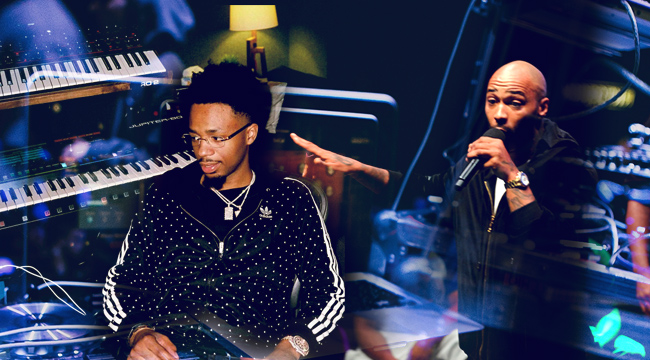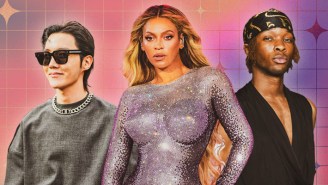
On Monday’s Everyday Struggle episode, self-proclaimed “Chief Cultural Director” and semi-retired rapper Joe Budden found a good deal of humor in producers having their beats stolen. While discussing producer MilanMakesBeats’ claims that Playboi Carti stole his beats without compensation and threats to beat up the “pieon,” Budden had a hearty laugh about the producers whom he gave similar treatment in his sixteen-year career.
When DJ Akademiks had a rare morality moment, noting “we can’t co-sign producers gettin’ finessed,” Joe scoffed “oh please,” then raised an argument that producers shouldn’t be upset about getting stiffed because recording artists don’t get paid much from streams. It may be true that rappers aren’t rakin’ it up from music sales, but that doesn’t absolve them of their duty to pay producers whose beats they use. You can’t tell your landlord that your job isn’t paying you a lot and expect them to care.
When show moderator Nadeska asked Budden, the same guy who berated Lil Yachty about being on top of his business, to offer advice to young producers he said, “I’m not teaching that n—- sh*t” because “I might need a free beat.”
Budden then deemed producers wanting a signed contract as “extra” and said, “I don’t have to do none of this [fair negotiating]… I’ll lay a whole song to your two-track and send it right to iTunes.” Really? That’s what flies in “the culture? for Budden”
Comments like Budden’s are exactly why hitmaking producer Sonny Digital recently suggested a producer’s union, so that producers can leverage more respect from an industry full of artists like Budden and Birdman who find no issue with screwing over producers, and rappers like French Montana, who forgot the names of the producers who crafted his seven times platinum “Unforgettable.”
Hip-hop producers are perhaps more important than ever. More often than not, the beats they craft are the most beloved aspects of songs. Their melodies and drums are what make songs rock in the club, bang in the whip and get heads nodding. Plus, we’ve all seen how bad things can go when these guys rap acapella. But despite the producer’s vitality in the musical equation, their treatment remains wholly unethical.
Budden said on the show, “If you’re a new [producer], and you’re coming too much with this legal paperwork bullsh*t, I’m gonna rob you,” bizarrely resentful at the audacity of a producer wanting to put a deal on paper. What’s troubling is that Budden was robbed of his own shot at stardom by Def Jam in the mid-00s, so why would he be so apathetic toward the plight of producers who, just like he once was, are being used up and disregarded by the music industry’s capitalistic machinations?
How would he have felt if Jay-Z — even then one of the most powerful men in music — flexed his industry muscle and ganked “Pump It Up” from him, a beat that Rocafella producer Just Blaze had been shopping in house? Would he be able to laugh while his life-changing work was taken from him without renumeration?
It’s not just up and comers facing such woes, though. Grammy-nominated producers J.U.S.T.I.C.E. League came out against Chance The Rapper, claiming they haven’t been paid for their production on Coloring Book. Bangladesh had to sue to be paid for “A Milli,” one of the biggest songs of Lil Wayne’s career. Jim Jonsin sued for compensation for “Lollipop,” and DVLP says the same of Wayne’s “Fireman” – though if we’re to believe the reports Wayne himself may not have been paid for those songs.
Beyond hip-hop, a 2015 feature in The Guardian cites an unnamed “high-profile producer” who recalled that a big-budget movie apparently didn’t have the budget to pay him for a beat they were trying to get in exchange for “exposure,” which has yet to solve an eviction notice.
The game is overrun by hordes of artists and label heads who claim to be from the streets, which makes their unwillingness to pay for good product perplexing. But if Budden’s defiance and dismissive tone is any insight into how artists feel about jackin’ for beats, most producers not named Pharrell, Swizz Beatz, or Metro Boomin will continue to be seen as expendable until they do something about it.
Hopefully the groundswell of attention paid to the recently created Catch A Soundcloud Rapper Twitter account spawns an industry of similar services that expose fraudulence. The twitter account, which also highlights producers finessing rappers –- along with other salacious DMs –- is doing a good job of putting pressure on artists to do right by each other. It was this account that initially reported the Playboi Carti incident which eventually made its way up to Complex.
The @CatchaSCrapper Twitter is a start, but it’s not enough for the wrongdoings of relatively obscure upstarts to be exposed. Sonny Digital and other producers should seriously look into developing that union, which would allow them to share information on violators (in their ranks too) and present a united front. If artists knew jerking a relatively unknown producer would mean problems with Digital and other certified hitmakers, perhaps they’d think twice about not paying or jacking loops from websites. DJs band together with DJ pools for that very reason.
Until then, producers would do well to copyright their material, and sign up with ASCAP or BMI, the two most prominent performance rights organizations in America. It may seem like a hassle for producers to register beats when their peers are getting fast money, but protecting yourself is the golden rule of surviving the music business. Artists may glorify “the bag” of one-time money, but truly successful ones know the value of ownership and residual income. If Milan’s beats were registered, he wouldn’t have to be subjected to Carti’s DM threats, he could just take him to court and get the royalties he was owed.
Also, if a producer loves the craft of making music but doesn’t desire to work with artists, they can transition into producing instrumental projects and touring like Metro Boomin and Just Blaze, or do licensing work for TV shows, movies and video games through reputed companies. These are all lucrative avenues for a producer who has the gall to want to be paid for their work.
Hip-hop is the biggest genre out and a good deal of that achievement belongs to producers, who have provoked some of the most important poetry the world will know. They set the vibes. They got the keys. So it’s up to us to do our part, whatever that means, to make sure the producers that keep our playlists “lit” can keep their houses lit too.






